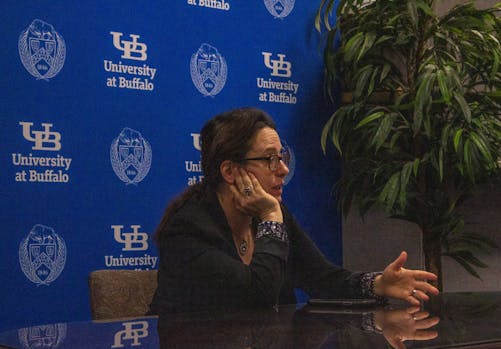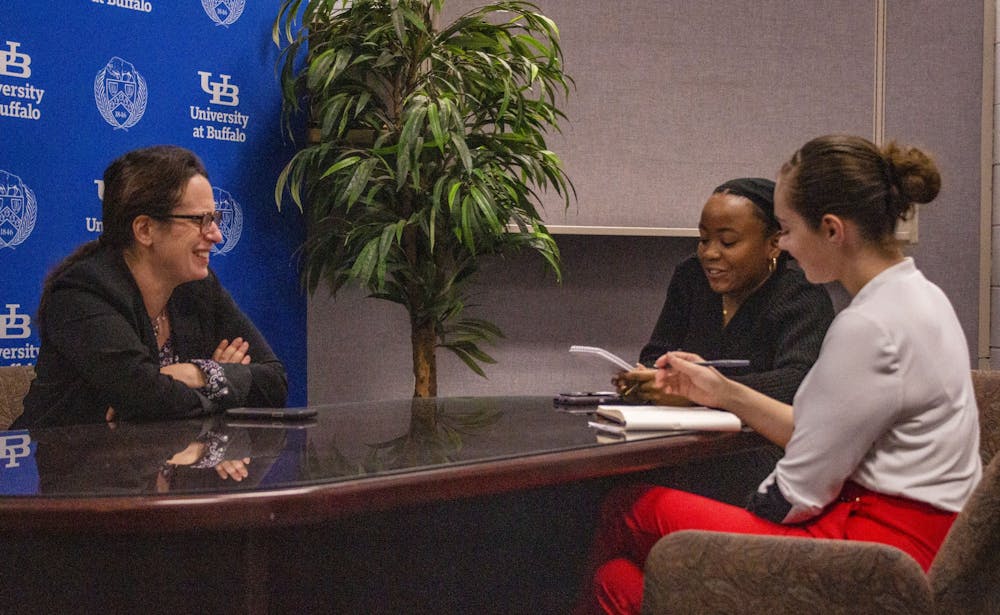Maggie Haberman knows her critical coverage of President Donald Trump “probably works at [her] disadvantage.” But she says she isn’t writing for the president’s approval.
Haberman believes if she wrote any other way, it wouldn’t be the truth.
Before her speech at the Center for the Arts Thursday, Haberman, New York Times’ White House Correspondent and a 2018 Pulitzer Prize winner, met with Spectrum editors for an exclusive Q&A where she discussed reporting on Trump’s White House, how technology today has changed journalism and her mental health.
Our interview, lightly edited for length and style, follows below:
The Spectrum: You are regarded as the best-sourced reporter in Washington D.C. How do you set yourself apart from other reporters, and how do you describe yourself as a reporter?
Haberman: I don’t consider myself to be the best-sourced reporter in Washington, partly because I don’t live in Washington, I live in New York and I go to D.C. once a week on average.
This is a bit of an unusual presidency, for a variety of reasons, obviously, but Trump came into Washington with a bunch of people who are not of Washington and so I think that helped me in terms of figuring out how to navigate his government a little better in terms of figuring out who to talk to and who to approach.
In terms of maintaining it, a habit that I developed when I was a clerk at the New York Post, which was in 1986, was I got a beeper. This was pre-cell phones and I would always just be on call if they needed a runner to go to a general assignment reporter and so basically, that’s still how I function. There’s a lot of sources in government who want to talk after hours because they can’t talk when they’re at work, so I have lots of conversations at 10 p.m. But you have to be prepared to be be called at 10 p.m. which means that invariably there’s something in my house that I’m not doing that time of night because I’m having conversations.
It’s just basically constantly being plugged in, which is not great in terms of being able to step back sometimes and assess and figure [things] out. Just make sure you’re not nose-to-the-glass and focusing on things that don’t matter. That’s basically it, it’s just timing and luck of timing.
TS: You got your first full-time reporting job in ‘98. How have you seen technology change journalism, and what is it like to adapt so drastically to so many technological changes across your time reporting?
H: I remember when the Monica Lewinsky scandal broke in ‘98, and I was working at the New York Post city desk as a clerk and the Drudge Report had just become a thing. … It was a big deal because we would have to check Drudge every night and this was completely different, we’d never done this before
Then, when everybody developed websites, we would check the Times website, their stories would go online at midnight. We would often then have to scramble between midnight and 1 [a.m.] to match something that we didn’t have.
So that felt wholly unnerving as a technological change, and still it went from beepers to those weird longer messenger pager devices to smartphones and then to the advent of Twitter. I mean blogs changed the way that political reporting works in a way for good. Twitter has just shattered everything and not the least of which is because it’s the forum that the president uses. I tried staying off Twitter, [I] can’t, it’s where the job takes place now.

Maggie Haberman, Pulitzer Prize winning journalist, White House correspondent for the New York Times and CNN political analyst.
TS: What have been your biggest obstacles or setbacks in reporting and how do you overcome these challenges?
H: That’s a really good question, that I don’t think I’ve ever been asked. I think there’s different types of obstacles. There’s the obstacles that get the stories wrong, which is the worst feeling in the world. I think the best thing you can do is correct it quickly, own it and try to make clear that you were wrong. … There are days in this job, if you’re covering a beat that you don’t really like that it can be hard to get up and go to work, but you have to just stick around.
TS: What lessons have you learned through journalism that you use in your life off the job?
H: Try not to react. I mean, that’s the problem with Twitter, which I realize I keep coming back to you, but it’s basically designed to elicit reactions and what we do in journalism is supposed to be trying to be devoid of reactions and actually just taking information and processing and reassembling it in a way that is faithful to the facts, in a way that is accurate. …
I mean, it’s just about balance. It’s about balance and it’s about giving people a hearing. It’s about making sure that you have a full set of information, in the case of dealing with my children’s schooling, it’s making sure that I have the right amount of research. It’s making informed decisions.
That is where the job has probably helped me more than I realize.
TS: Why do you frame the way you talk about the president in your reports the way you do? And do you feel the critical perspective works in your favor?
H: No, I think it probably works at my disadvantage.
TS: Why do you continue?
H: Because I think it’s accurate. Because I think that if I did something differently, it would not be the truth. And I think that we are not writing stories for his approval. The thing I find myself saying to a lot of people in the White House these days is we are not short order cooks. This is not how this works.
And look, no president likes their media coverage. I have yet to meet the elected official who likes their media coverage. … We don’t need their permission to do it right. And we’re not looking for them to say ‘Yes, this is a perfect encapsulation of how this is’ because in Donald Trump’s mind, to cover him accurately is to cover him unfairly. And that is what I’ve learned over time. So I’m going to keep covering him the way that best characterizes what he’s doing and the chips fall where they fall.
TS: So, in your own words, what is it like reporting on the Trump White House?
H: It is so exhausting and it’s hard for me to put it into words in general. I mean, look, I don’t think we’re ever going to cover anything like this again. I think that lots of norms will not return to what they were, but I don’t think we’re ever going to cover a story like this again. So it is exhilarating and it’s fascinating and I feel very fortunate to be able to have a front row seat to all of this. But it is, it is a lot.
TS: Has your work affected your mental health?
H: It is only recently that I have started feeling a little bit of battle fatigue, and literal fatigue. I just think this is a lot and I think that sometimes it is actually better when we’re just kind of focused on the traffic in front of us as opposed to looking all around the road.
I don’t think it's affected my mental health. But I think it has affected my sense of exhaustion.
TS: And how do you balance your personal life and your family with your non-stop role as a journalist?
H: With difficulty, with a lot of difficulty. I’ve been trying to do a little less traveling, so the next year is going to be really hard but my kids were not happy that I had to go away this week. I do the best I can.
The news desk can be reached at news@ubspectrum.com.

Alexandra Moyen is the senior features editor of The Spectrum.

Jacklyn Walters is a senior communication major and The Spectrum's managing editor. She enjoys bringing up politics at the dinner table and seeing dogs on campus.





